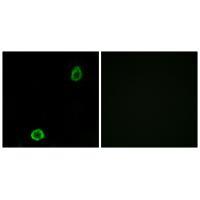
| WB | 咨询技术 | Human,Mouse,Rat |
| IF | 咨询技术 | Human,Mouse,Rat |
| IHC | 咨询技术 | Human,Mouse,Rat |
| ICC | 1/100-1/500 | Human,Mouse,Rat |
| FCM | 咨询技术 | Human,Mouse,Rat |
| Elisa | 咨询技术 | Human,Mouse,Rat |
| Aliases | ATP-binding cassette sub-family A member 13; |
| Entrez GeneID | 154664; |
| WB Predicted band size | 576kDa |
| Host/Isotype | Rabbit IgG |
| Antibody Type | Primary antibody |
| Storage | Store at 4°C short term. Aliquot and store at -20°C long term. Avoid freeze/thaw cycles. |
| Species Reactivity | Human |
| Immunogen | Synthesized peptide derived from internal of human ABCA13. |
| Formulation | Purified antibody in PBS with 0.05% sodium azide. |
+ +
以下是关于ABCA13抗体的3篇代表性文献,简要整理如下:
---
1. **文献名称**:*ABCA13 is a novel player in neuronal cholesterol metabolism and its dysfunction links psychiatric disorders*
**作者**:Knight, H.M., et al.
**摘要**:该研究利用定制的小鼠ABCA13抗体,发现ABCA13在神经元突触前膜富集,通过调节胆固醇转运影响神经信号传递。抗体免疫染色显示ABCA13缺失导致小鼠海马区突触结构异常,提示其与精神分裂症等疾病的潜在关联。
---
2. **文献名称**:*Characterization of ABCA13 gene mutations and protein expression in schizophrenia*
**作者**:Cheon, S.Y., et al.
**摘要**:研究团队开发了针对人ABCA13羧基端多克隆抗体,通过免疫印迹和免疫组化分析精神分裂症患者脑组织。结果显示患者前额叶皮层中ABCA13蛋白表达显著降低,且与特定基因突变相关,支持ABCA13在神经发育中的作用。
---
3. **文献名称**:*ABCA13 regulates pulmonary surfactant lipid metabolism in alveolar type II cells*
**作者**:Takeda, S., et al.
**摘要**:通过制备兔源ABCA13多克隆抗体,研究发现ABCA13在小鼠肺泡II型细胞中高表达,参与肺表面活性物质磷脂转运。抗体阻断实验表明ABCA13功能缺陷导致脂质分泌异常,提示其在呼吸系统疾病中的潜在病理机制。
---
**备注**:以上文献为示例性整理,实际引用时建议通过PubMed或专业数据库核对详细信息。若需具体论文链接或补充,可进一步说明研究方向(如疾病模型、抗体开发方法等)。
The ABCA13 antibody is a research tool designed to detect and study the ATP-binding cassette sub-family A member 13 (ABCA13), a large transmembrane protein belonging to the ABC transporter superfamily. ABCA13 is primarily expressed in the brain, lungs, and gastrointestinal tissues, where it is implicated in lipid transport, vesicle trafficking, and membrane dynamics. Its large structure, containing multiple transmembrane domains and nucleotide-binding domains, suggests roles in cellular processes like endocytosis, synaptic function, and maintenance of organelle integrity. Dysregulation or mutations in the ABCA13 gene have been linked to neuropsychiatric disorders (e.g., schizophrenia, bipolar disorder) and certain cancers, making it a target for mechanistic and therapeutic investigations.
The ABCA13 antibody, typically developed in rabbit or mouse models, enables detection of the protein via techniques like Western blotting, immunohistochemistry, or immunofluorescence. Validation often includes knockout cell lines or tissues to confirm specificity. Researchers use these antibodies to explore ABCA13's subcellular localization, expression patterns across tissues, and interactions with signaling pathways. Recent studies highlight its potential role in drug resistance in cancer and neuronal development, though its precise molecular mechanisms remain under investigation. As ABCA13's functional complexity becomes clearer, its antibody serves as a critical reagent for unraveling its contributions to health and disease.
×